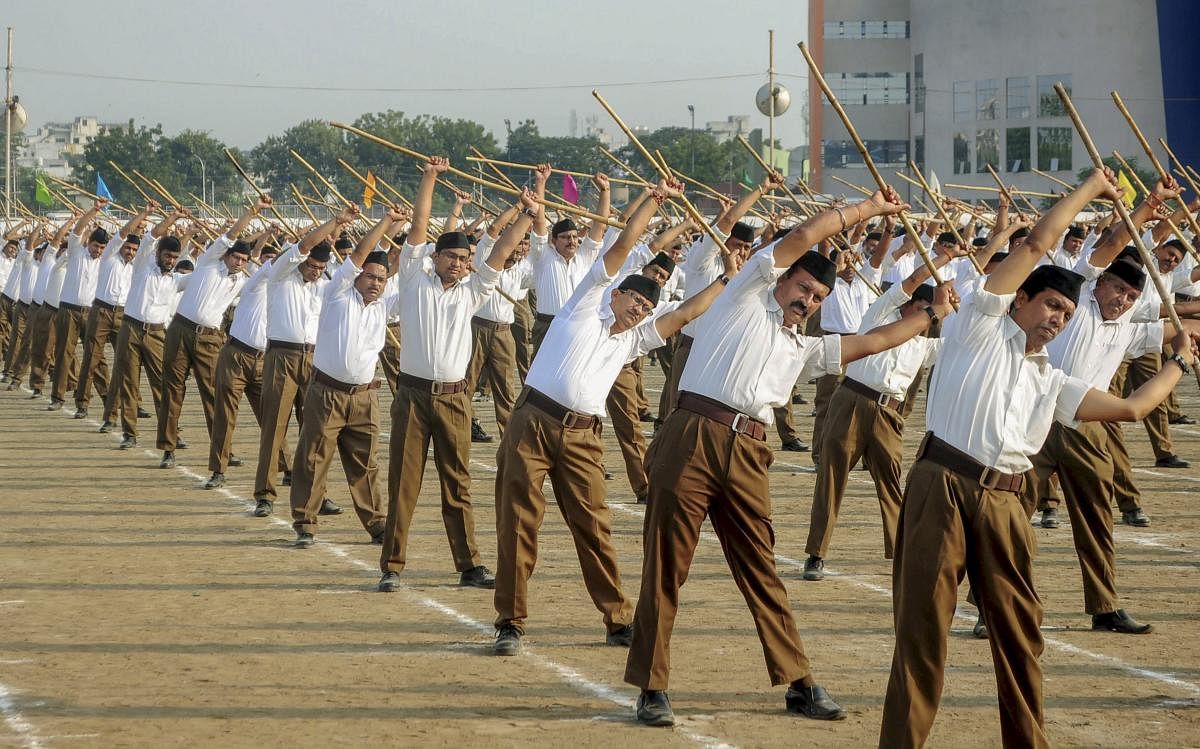
For the first time, a woman — mountaineer Santosh Yadav — will be the chief guest at the Rashtriya Swayamsevak Sangh's (RSS) annual Vijayadashami celebrations in Nagpur on October 5 this year.
Only adult males are allowed entry to the RSS shakhas. Women — primarily mothers, wives and sisters of swayamsevaks — can associate with the Sangh's women's wing, the Rashtra Sevika Samiti.
Over the years, and most recently from Congress leader Rahul Gandhi, the RSS has faced criticism that women remain at the periphery of the Sangh's activities.
The likelihood that the RSS will allow women into its shakhas by the time it marks its hundredth anniversary in 2025 — the RSS was founded on Vijayadashami day in 1925 — is slim. But a woman as the chief guest at its Vijayadashami function is evidence to many that the RSS is trying to shed some of its shibboleths as it approaches its centenary year.
RSS chief Mohan Bhagwat's outreach to Muslims on Thursday, when he visited a mosque and madrasa in the national capital, is seen as further proof of this. A Sangh functionary told the media that a visit to a madrasa was a first for Bhagwat.
Commentators, including some Muslims, lauded Bhagwat's outreach as a move in the right direction in today's fractious times. They pointed out Bhagwat's interaction with Muslim intellectuals in September 2019, another a couple of months back and his suggestion, ostensibly to his ilk, to not go looking for a shivling under every mosque.
During the upcoming Ramlila festivities, the RSS in Delhi will reach out to Valmikis, a Scheduled Caste, to hold Ramlilas and organise events to honour 15th-century poet Sant Ravidas, a Dalit icon.
The Sangh is involved in a similar outreach to several Dalit and OBC castes in Uttar Pradesh, Jharkhand and other states. On record, RSS insiders maintain that the Sangh does not believe in the caste system, so there is no way of knowing whether the representation of OBCs has increased in its hierarchy.
But projecting Narendra Modi, an OBC, and the social work by its affiliates is part of the RSS effort to counter the criticism that it is a deeply Brahminical outfit.
According to a long-time RSS watcher, Sangh's activities and actions are linked, and should be interpreted, in the context of the prevailing socio-political context, how they would play out in the public perception and achieve their objectives.
If the RSS has invited Yadav, a woman, as the chief guest at its Vijayadashami celebrations this year, it hosted Sant Nirmal Das, which it touted as its first Dalit religious leader chief guest, in 2017.
The visit of former president Pranab Mukherjee, a Congressman, to the RSS headquarters in June 2018 was widely covered.
"The RSS has a penchant for inviting celebrities and for event management. An invite to Yadav may not mean that its views on women have changed," said a Sangh observer.
On September 28, 2018, the Supreme Court allowed entry of women of all ages into Kerala's Sabarimala temple. The RSS, however, compromised its stated position on the issue of gender equality when it opposed the entry of women for strategic reasons – to defeat its ideological opponents, the communists in Kerala.
A little over a week before the SC verdict, at a three-day lecture (September 17 to 19, 2018) at New Delhi's Vigyan Bhavan, Bhagwat said the Sangh had removed offensive references to 'Muslims' and 'Christians' as internal threats in M S Golwalkar's book 'We or Our Nationhood Defined'.
They have been rephrased as 'Islamic fundamentalism' and 'evangelism'. The outreach was to tell anyone who would care to listen that the RSS was a moderate, flexible organisation, willing to review some of its positions in a changing world.
Past outreach
But Bhagwat's recent outreach to Muslims isn't new for the RSS. During the years of the Atal Bihari Vajpayee government, then RSS chief K Sudarshan held a similar outreach.
If Sudarshan's initiative came in the context of the Gujarat riots of 2002 and the uproar in the aftermath of the violence, Bhagwat's effort comes in the wake of the criticism of former BJP spokesperson Nupur Sharma's comments against the Prophet and incidents of violence against Muslims.
The truth remains that there is not a single Muslim in the Union council of ministers, and the BJP refused to field even a single Muslim as its candidate in the UP Assembly polls earlier this year.
However, the RSS outreach among tribals, OBCs and Dalits through its affiliates like the Vanavasi Kalyan Ashram, which runs over one lakh schools, and Sewa Bharati, which claims to run 1.7 lakh welfare projects, are its success stories.
According to Sangh insiders, Bhagwat admires Madhukar Dattatreya 'Balasaheb' Deoras, the third RSS chief, the most among all its sarsanghchalaks.
As author Dinesh Narayanan has written in his book on the RSS, for Deoras, "there was nothing sacrosanct that it could not be broken", and the only guiding principle was that 'Hindustan is a Hindu Rashtra'. Everything else could change.